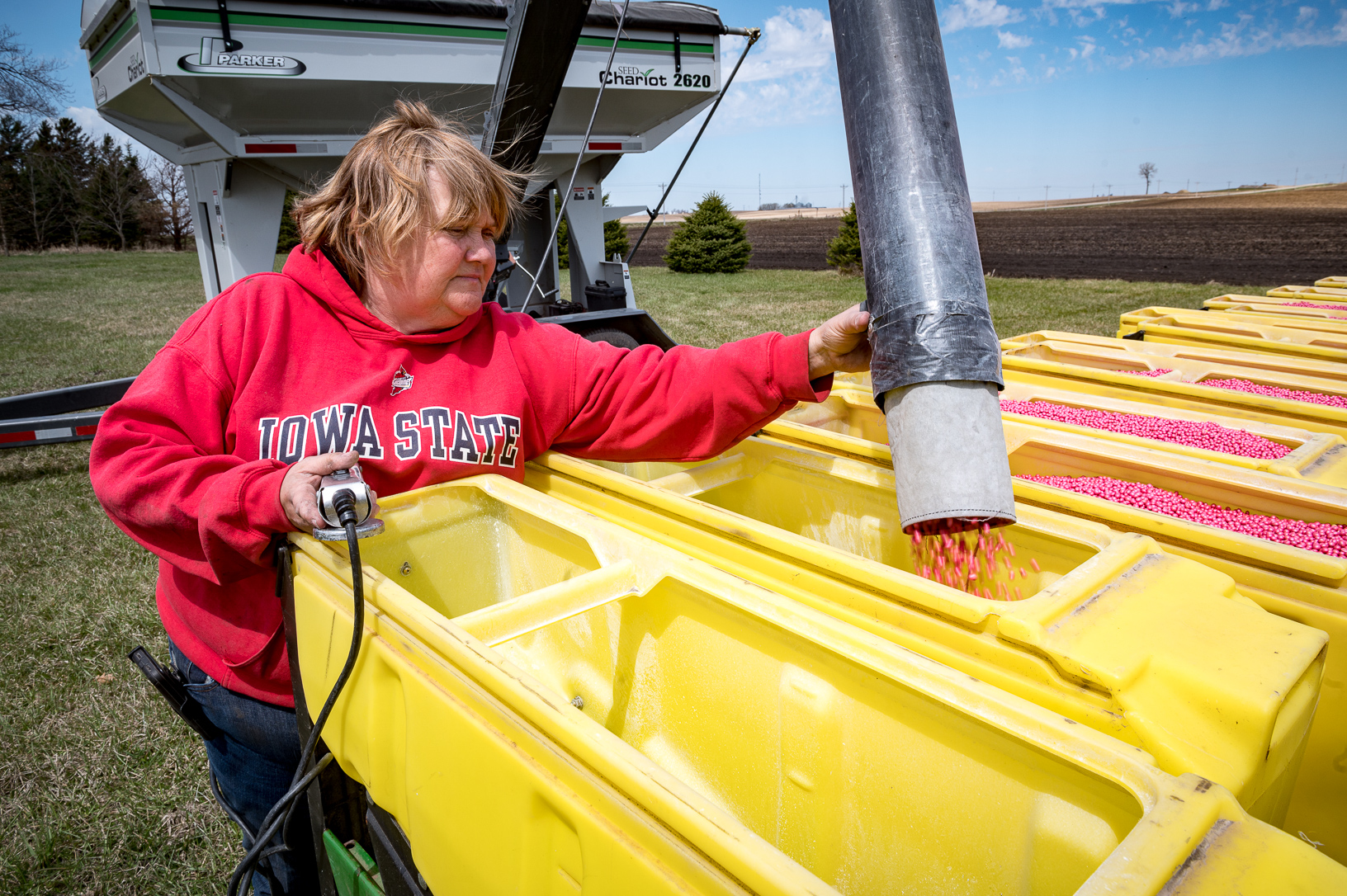
Farmers are concerned they may be losing an effective tool in the fight against weeds after the Ninth Circuit Court of Appeals decided June 3 to vacate three dicamba registrations. (Photo: Joseph L. Murphy/Iowa Soybean Association)
Three dicamba products vacated, farmers in limbo
June 11, 2020 | Bethany Baratta
April Hemmes has grown soybeans in the Roundup Ready Xtend Crop system since it was first available in 2016. She relies on XtendiMax with vapor grip technology to continually grow a productive crop in north central Iowa. She adheres to the label and checks the accompanying RRXtend Spray app on her phone which helps guide her decisions surrounding product usage. She also considers nearby farmers who could be adversely affected if the product isn’t appropriately applied.
She’s relied on the system because of its proven performance and because it provides the ability to use dicamba when it’s necessary to treat resistant weeds.
“This product has served me and a lot of other farmers very well,” Hemmes says. “It’s been a great tool.”
But Hemmes may have to move away from that tool as the Ninth Circuit Court of Appeals decided June 3 to vacate three dicamba registrations (XtendiMax with vapor grip technology, Engenia, and FeXapan).
In a letter to EPA’s administrator Andrew Wheeler, ISA President Tim Bardole expressed his concern and urged EPA to promptly review, consider and present options addressing the Court’s directive to ensure farmers’ ability to apply existing stocks during the 2020 growing season.
The EPA issued an order on June 8, providing some clarity after the Court’s decision. The cancellation order says farmers and commercial applicators may use products that were in their possession on June 3, the effective date of the Court’s decision. The Iowa Soybean Association (ISA) is seeking clarification on the use of products which have been purchased but not yet received by June 3.
Iowa State University agronomists encourage farmers and applicators to confirm with their insurer that liability coverage will still be provided should the product move off-target. After July 31,2020 all use is prohibited.

April Hemmes has relied on the Roundup Ready Xtend Crop system since it was first available in 2016. (Photo: Joseph L. Murphy/Iowa Soybean Association)
Future implications
The Iowa Department of Agriculture and Land Stewardship has not issued a stop sale order and will continue operating under the current pesticide program until it receives guidance from the EPA. The Department says it does not anticipate taking enforcement action against those who otherwise appropriately purchase, sell, or use these products in the interim. However, this enforcement decision may change immediately based on further guidance from the EPA.
The questioning of the future of the three dicamba products comes as farmers are applying herbicides to their 2020 soybeans.
“Weeds are still the No. 1 problem in crop production,” said Ed Anderson, senior director of research for the Iowa Soybean Association. “This decision by the Ninth Circuit Court of Appeals takes a useful tool out of the toolbox for farmers and does it at a horrible time.”
Known for its collaborative efforts to bring together various public and private partnerships to find solutions for farmers, the Iowa Soybean Association Research Center for Farming Innovation has been utilizing checkoff funds to research integrated weed management solutions. The ISA website research tab contains results from state-wide replicated strip trials for herbicide studies dating back to 2009. Beyond the ISA Center, Iowa soybean farmers’ checkoff monies are invested in state, regional and national weed science and weed management programs at universities. These research and Extension programs examine and communicate integrated weed management solutions that include herbicide use, effectiveness and stewardship. Several examples of current research and proposed research include mechanical weed seed destruction, concentrating weed seed in rows of harvested chaff for mulch germination inhibition, alternative chemical control and electrocution of weed plant escapes above the soybean canopy, agronomic practices like cover crops that inhibit weed growth, amongst others.
“The Iowa Soybean Association, like the United Soybean Board’s Take Action program and the Iowa Pest Resistance Management Plan, supports an integrated approach to weed management that includes investing in a broad spectrum of research and development, combined with appropriate on-farm agronomic practices, field scouting, and the application of traits, chemistries and technologies to combat weeds,” Anderson said. “By understanding their weed issues, farmers can work with ISA and other experts to implement long-lasting and effective weed management solutions.”
A wealth of information exists on the National Soybean Checkoff Research Database and the Soybean and Information Network (SRIN) website.
Hemmes—like many other farmers and distributors—are awaiting a final decision about the future of the three dicamba products. She’ll consider another product, Syngenta’s Tavium, which wasn’t vacated, if the need arises for the 2021 cropping system.
“I know I have waterhemp resistance in my fields where soybeans will be next year,” she said. “So solely using Roundup isn’t an option.”
Dangerous precedent
If the Court’s decision stands, ISA District 6 Director Dave Walton says it sets a dangerous precedent for the future use of any ag inputs.
“It’s troublesome that the court took the stance that it did,” says Walton, who farms near Wilton. “Instead of sending this back to the EPA for further review, the court said it was just going to vacate the registration of these three products. In doing that, it opens up the opportunity for any activist group to take on any other herbicide which EPA has previously approved. Who knows where this ends?”
Contact Bethany Baratta at bbaratta@iasoybeans.com.
Back